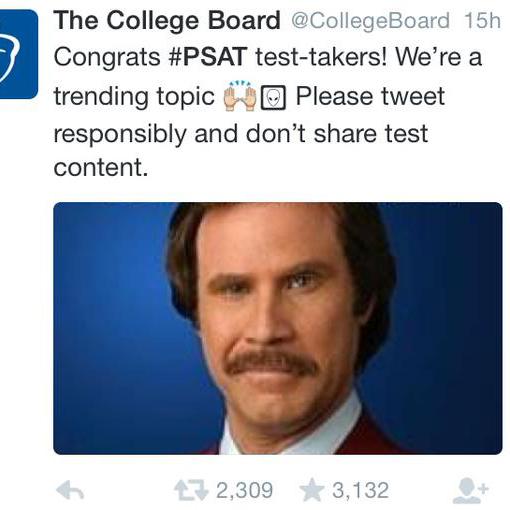Social media pokes fun at the PSAT
Criticism and jokes on Twitter lead by students adds fuel to the fire

Photo courtesy of Twitter
College Board reminds students to keep test content confidential, although the rule has somewhat already been broken.
December 11, 2015
Social media was intended to be a marvelous, multi-purpose tool used for communication and accessing trending information. One of these latest trending sensations is making fun of the PSAT.
In 2014, social media lit up with jokes aimed at the phrasing of the exam. However, the latest edition of the PSAT was the equivalent of a poorly written, dry, and drawn out comedy.
What happened next was almost inevitable. The teens that took the PSAT, with their high sense of sarcasm and the instinct to post everything about their life online, battered the test into oblivion on social media.
It all looked like good fun. However, before taking the test, students were required to sign a contract stating they wouldn’t share test answers and questions with others, including on social media.
This lead to many students feeling unhappy about the potential of their test score being terminated in consequence for liking or posting content poking fun at the exam, despite the exam changing each year.
“They can just change the test to adjust problems that have leaked [rather than punish students],” sophomore Diego Garcia said.
Fortunately, there are several reasons students should not be worried about potential backlash for such social media activity. First, this is not a new occurrence.
Last year, the 2014 PSAT was also hammered online, without real backlash or any major incident occurring. Second, the sheer number of students liking and posting memes acts as a protective barrier.
If the College Board were to nullify all the tests of everyone participating, most, if not all, of the tests taken would be made void.
“Because there are many people talking about [the PSAT] they are not going to be able to punish everyone,” said sophomore Jiho Choi.
Another reason the College Board might avoid punishing students is the potential of law suits.If they accessed students’ social media accounts they could be hit by recent court rulings that classified students’ ability to criticize schools and organizations on social media as Freedom of Speech.
As the posts do not violate the PSAT’s integrity and its confidentiality, students can be safe in the knowledge that reposting or liking this content will more than likely not result in potential punishment from the College Board.




